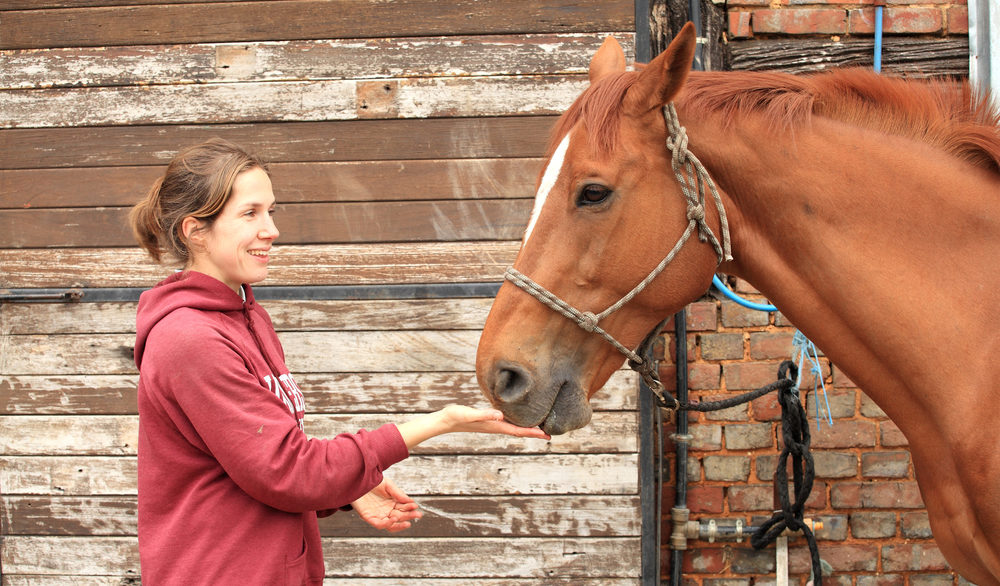Experts say that equine therapy and other therapies, like zip-lining and art therapy, can help people recover from sex addiction. How can being on a horse or expressing yourself through art make a difference?
Experiential therapies or action therapies can sometimes accelerate healing where other therapies, such as traditional talk therapy, prove less effective. Often times, people who engage in sexual misconduct or other negative behaviors to escape from pain or to cope with problems are often people who have difficulty talking about themselves or their personal issues in healthy ways. They may arrive at rehab feeling closed-off and unequipped to give voice to their feelings or experiences. They may shut down during group therapy or individual counseling sessions, or find they can discuss the issue easily on an intellectual level, but not see how it relates to them on a deeply personal level. Equine therapy can help them access and connect with their feelings and responses in physical ways.
“Even clients are sometimes unsure about how spending time with a horse is going to help them overcome their issues,” says Danielle Sukenik, LMFT, an addiction counselor and equine therapist at The Ranch treatment center in Tennessee. “They don’t yet understand how powerful experiential therapies can be—the simple act of communing with a horse can center them and mirror their own feelings.”
Horses are great at mimicking relationships—relationships with self, spouse and family members. Horses have the ability to respond to emotional cues and actions in the moment, and their response to a person provides immediate feedback regarding actions or behaviors. Sometimes the very act of caring for or riding a horse can bring up buried emotions or alter a person’s perception. “Equine therapy is a great way to experience how we affect others, to work on trust issues and to try out new and different problem-solving methods,” adds Sukenik.
Experiential Therapies Complement Talk Therapy
Addiction counselors at The Ranch generally find that once a client has a few sessions of equine therapy, zip-lining or another experiential therapy, a couple of things happen. They tend to become more open and forthcoming during talk therapy, gain a deeper and more organic understanding of the issues they have been discussing and how those issues relate to them.
“During talk therapy, clients are focused on understanding their issue and its consequences from an analytical perspective,” says Sukenik. “But it’s one thing to understand something intellectually, and quite another to understand it physically and at a deeply personal level. Experiential therapies, like equine therapy, are often the mechanism that helps clients build a bridge between their intellectual understanding of their issue and what has led them there, their physical or visceral understanding of the situation and how their behaviors are negatively impacting others.”
Getting People Out of Their Comfort Zone Brings New Insights
Ironically, disengaging the mind from intellectual analysis and engaging the whole person through physical or action methods, either through guided outdoor activities or animal-assisted therapies, can increase self-awareness and a mind-heart connection. Why? Taking a person out of a controlled environment with known factors and placing them in a new environment with many unknown variables can deliver surprising outcomes. Being in nature and interacting with people and animals in the outdoors can shine a light on problematic approaches and negative behavior patterns.
Some approaches, attitudes and behaviors simply don’t work with animals, particularly horses. They are big, powerful animals that must be treated with respect, and they won’t respond well to people they sense they can’t trust. Therefore, a person approaching a horse must be both respectful and trustworthy. Once a person becomes more self-aware and learns to adjust their approach to the horse, the horse will become more responsive to them.
According to research, the necessity of self-awareness and self-adjustment in order to interact positively with horses is one reason why equine therapy has proven to be effective for people with sex addiction, conduct disorders, impulse control disorders, and for those who struggle with mood disorders, like depression or other issues like trauma.
“We have seen equine therapy help people develop more sensitivity or empathy, greater self-confidence, a more realistic self-image and improved communication skills,” says Sukenik. “Through interacting with horses, many clients here at The Ranch have gained a new awareness of their nonverbal communication, how it affects others, and how they need to alter or adjust it. Interacting with horses encourages people to be gentler and more authentic.”
While experiential therapies can greatly enhance treatment for addiction and mental health disorders, this doesn’t mean that talk therapy isn’t valuable as well. A holistic approach to treatment that integrates body and mind through traditional psychotherapy, experiential therapy, group support, education and alternative modalities can provide clients with multiple approaches to healing. Where one therapy doesn’t work for an individual, another one being offered in the treatment regimen will—and animal-assisted therapy resonates with many.
Rehab isn’t all talk therapy all the time, and perhaps it shouldn’t be.
As addiction expert and investigative reporter Brad Lamm told Dr. Oz after a visit to The Ranch, “Rehab is 24/7 and you’re not in group therapy 24/7. The ability to have these action methods where you move your feet and your heart will follow are really important in helping a mind change, a heart change and a spirit shift.”








